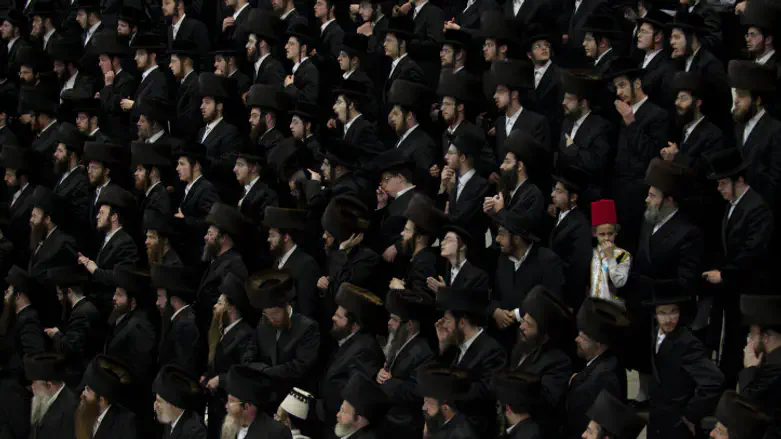
Dr. Harold Goldmeier is an Instructor at Touro University, Jerusalem, a small business owner, and writes about finance, social, and political issues. He is a free public speaker for community groups and consults on matters of commerce and industry. He can be reached at harold.goldmeier@gmail.com.
The crisis between the Haredim and Zionists has the makings of an existential threat to the Jewish state. My review of Tuvia Tenenbom's new book gives remarkable insight into the workings of this community. Tuvia explores and uncovers segments of the haredim, each following their own rabbi as is known to anyone who knows them. He reveals the good and the bad, contributions to a civil society and narcissism. Tuvia focuses on individuals, one on one, as he seeks to revive memories of youth.
Tuvia Tenenbom’s newly released book in English, Careful Beauties Ahead! My Year With The Ultra-Orthodox (Gefen Publishing House, 2024) is the latest in his oeuvre of witty creative nonfiction. (It is unfortunate that he used the term Ultra-Orthodox, which the haredim consider a pejorative. An insider would avoid the term, ed.)
The book is a mix of social anthropology and memoir. Throughout his labyrinthine storytelling, this reader was captivated by Tuvia’s encounters with clandestine haredi Jewish sects usually viewed as one large community by outsiders. They are not all alike. They do not observe Jewish law alike, share loyalties to the same rabbis, the women are not all Stepford wives, and some adults live on the brink of walking out of the community.
Tuvia brashly encounters haredi men and women on the streets, in their schools, synagogues, and homes to regenerate his youthful memories. His roots are among them. Tuvia was born, raised, and educated as one of them for his first 17 years. He dressed in black and spent days and nights learning Torah.
Tuvia left everything behind for adventures in the secular world; he forged a life in journalism and literature, watching the beauties on the streets while fressing in European and American cafés. Tuvia achieved the renown and the pleasure he was after. But his fond memories from parts of Jerusalem and Bnei Brak, home to the haredi sector, were indelible.
Now he tries to go home in search of roots and community. Tuvia immerses himself for a year among the haredim. The book is packed with Tuvia’s insights and revelations. We learn a lot about Tuvia but more about the lives and organization of the haredim. Doors open for Tuvia because of his arcanum, affability, and fluency in Yiddish, the first language of the haredim.
He finds the people friendly and generally happy with their lives; their bellies are full of delicious homemade traditional European Jewish foods made by grateful wives who get pleasure from their roles. Looking back, Tuvia ruminates, “These kids of Mea Shearim, who sometimes look like tough kids, are awesomely sweet.”
Know They Enemy
Angry secularists hate the haredim but will gain insights from Tuvia’s 551-page book. Enemies see the haredim as block voters who portray themselves as victims of the secularists (Zionists) trying to drive Godliness out of them. They generally reject modernism, secular education, most technology, and any language other than old-world Yiddish. Independent thinking is not approved of.
He explores how some in the community despise the government, the IDF, and the police. They fear a Satanic cabal is trying to persuade the haredim to become secular by threatening to cut off yeshiva subsidies, force religious children to spend time on secular studies, speak Hebrew, chastise religious men to work for a living where they will mix with non-religious people in workplaces, on trains, and buses and be enticed away from Torah study.
Drafting haredi students into the military is to force them to forsake their Godly ways and beliefs. They would rather die at the hands of Jew haters and the Zionists if that is God’s decree.
Tuvia writes, “Jews have been saved from total annihilation, they taught me,” by not forsaking Yiddish, black and white clothes, keeping the Sabbath, and believing their rabbis speak with and sometimes holier than God’s word.
While not everyone believes to the extreme of fringe haredi groups that “Zionists are not Jews,” the larger community acquiesces and remains silent. Extreme believers garner gravitas and chutzpa from the silent majority who fear for their personal safety, ex-communication, having their children outcast from schools, and daughters and wives shunned.
About 130 of Israel’s economists and 73 professors released a letter in May characterizing haredim as an existential threat to Israel. They claim that Haredim scantily contribute to the nation’s economy, an untruth based on how they measure contributions, and its military defense, a truth which is beginning to change. “There are no dogs…And no Progressives” in this community.